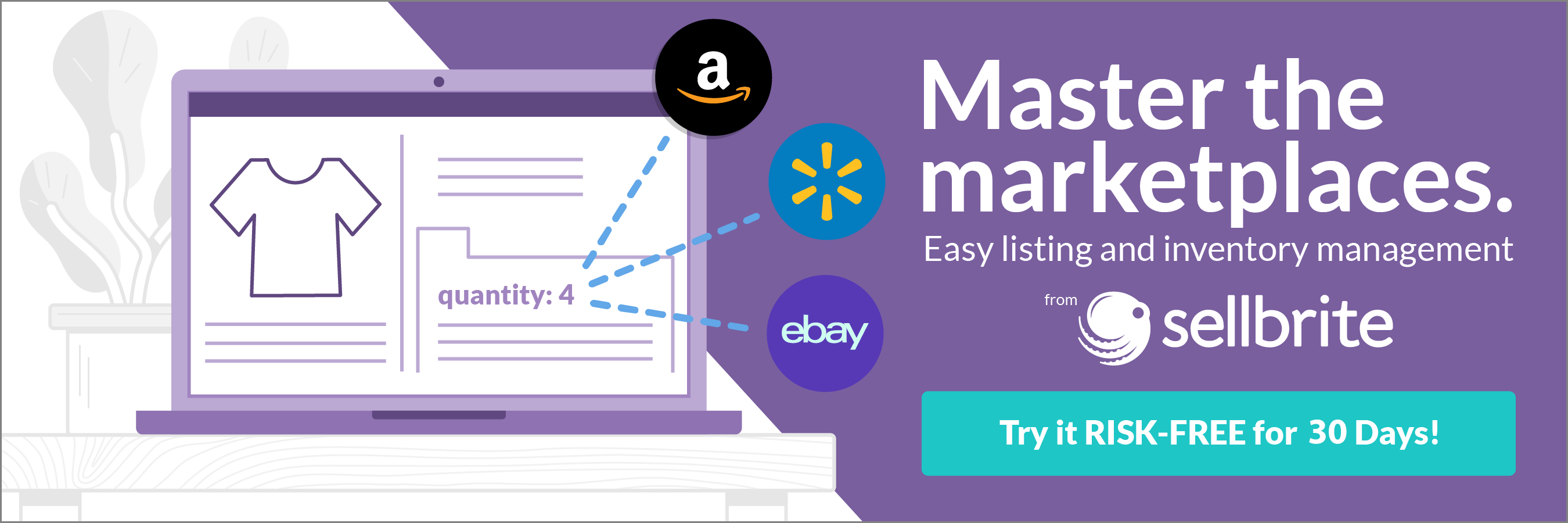For the longest time, I was under the impression that selling on marketplaces will always be less profitable than selling through your own store. Perhaps some of you share the same impression. In this post, I’d like to explore this idea in depth with some cold, hard facts… and a little math!
At first glance, selling on marketplaces would clearly seem to be less profitable than selling on your own store. After all, eBay and Amazon (and others) charge an average of 15% per sale as their commission. That’s a lot of profit getting eaten up from the get-go.
If you source a product for $70, and sell it for $100, your profit is effectively slashed in half. Instead of making $30 per sale (as you would theoretically make by selling on your own store), you are now making just $15 per sale. The other $15? Call it protection money, if you will, and Amazon and eBay are the Corleones of online shopping.
This hurts even more if you drop ship. Your margins are already super tight, at 20% or less, so your effective margin on the sale above would be $5 or 5%.
Compare that to selling something on your own store. Even if you drop-ship, you still get to pocket the full 20% profits, right?
Right?
Well not exactly. You will need to pay for your shopping platform, which is probably between $30-$70 if you use a hosted solution like Shopify or Bigcommerce, plus 2-3% transaction fees for credit cards.
But, that’s still a lot better than Amazon’s $40 per month + 15% per sale.
Wait, we seem to be forgetting something, though. What else do we need…
Shoppers!
Amazon gets nearly 900 million views every month, and when you list your products on their marketplaces, they give you exposure to all of those people for (almost) free.
Chances are that even on Amazon or Ebay, you will be selling fairly niche products. Let’s say you gauged the demand for your niche using the Google Keyword Planner at 4000 searches per month, which is fairly decent to start a store around.
Even if you only drove .001% of Amazon or eBay’s full traffic, that’s still 9,000 potential visits per month to your listings, and double what you would get if you managed to get to the first page of Google organic search and cannibalize every single click for the month. Whoo hoo! You’re rockin’!!!
Of course, getting even .001% of Amazon’s traffic for free is no easy task. So let’s buy some traffic.
Say you wanted to run ads and drive 4,000 clicks per month to your site. If you had to pay $0.75 per click (this is a conservatively low figure), that’s $3000 a month you would have to spend just for that much traffic.
Suddenly Amazon and eBay’s fees don’t seem too bad, right?
So that’s traffic. But what about…
Conversions
Even if you could get those 4000 potential buyers to your website, assume they convert at 1%, and that’s 40 orders per month — or $800 if your product is $100 and you have a profit margin of 20%. At this rate, you are flushing $2240 per month down the drain.
Whereas if you got the same 40 orders per month from Amazon or eBay, you’d pocket $200 every month (15% fees on $100 = $15, with a total margin of 20%, your profit is $5 per order).
Now that you mention conversions, there’s the whole notion of actually getting anyone to convert to start with! Why would someone buy from you, a relatively small business who they don’t know or have reason to trust and place their security in?
Trust
In 20 years of existence, eBay and Amazon have cemented themselves in our minds as being synonymous with online shopping. We rarely worry about the “trust factor” with them, but that always is an issue when buying from a smaller shop. So an added cost to having an online store is simply developing the “trust factor” – something that requires time, effort, and sometimes money, too.
Note: As you’ve probably realized already, I’m grossly oversimplifying these examples.
It’s unreasonable to build your business assuming that you will only get traffic from your main keyword – it’s highly likely that your traffic will probably come from long-tail keywords and you’ll [hopefully] get a lot more than 40 orders a month. I’m only using this example to show you that marketplace selling isn’t just an “ok idea,” it’s actually a “brilliant idea” depending on where and when you are with your business.
That’s not to say, however, that you should scrap any dreams of having your own store. In fact, it’s quite the opposite.
It’s necessary to have both because there are things you can do with an online store that you just can’t on a marketplace.
Here are some examples:
- Branding: To really build a business, you need to build a brand – just a storefront selling goods isn’t enough. Until you have a brand, it will be difficult for your business to really take off.
On eBay and Amazon, you have to stick to their rules and design, and your brand is just your name and your feedback score. On your website, your brand can have a much bigger personality. You can sell a lifestyle and clothe your store the way you want it to look. You can have your own blog. You can have a better social media following. - Customization: Amazon and eBay are terrific at moving product. But that’s about it – for you as a merchant, there is no cross-sell, up-sell, or discount popups. There are no customized forms, or buying guides. All of that has to be on your own storefront.
- Repeat Business: Email marketing was, is, and will be a dominant sales driver for a long while to come. On eBay and Amazon, the customer’s email address is hidden from you – all you can see is an alias that they generate for you instead. You can’t really send marketing messages to these aliases, and in fact the marketplaces have policies against doing so. They are not your customers; they belong to the marketplace. To cultivate your email list, you need your own website.
- Personalized Service: On eBay and Amazon, there’s no option for live chat or displaying an 800 number. And the contact seller link is usually buried two or three clicks deep. On marketplaces, the only service you can provide is what the marketplace lets you. While that may be sufficient, it’s certainly not going above and beyond, which you need to do to really stand out from the competition.
Conclusion
So there you have it – it turns out that selling on marketplaces might actually make more financial sense than selling on your own store when you’re still a young business. But ultimately it becomes necessary to a presence everywhere – and to nurture that presence on each channel.
What other thoughts do you have on marketplace vs. private store selling? Share them in the comments!



3 thoughts on “When Marketplaces Are More Profitable Than Your Own Store”
Missed probably the most important reason to have your own website if you do a lot of marketplace selling – the life jacket (aka insurance). There are horror stories out there of sellers getting kicked off of both venues for things completely out of their control – perhaps another seller/erchant falsely accuses you of counterfeiting, etc. Or if your main line of items is suddenly pulled off the marketplaces by the manufacturer, and at the manufacturer’s request Amazon doesn’t permit selling of that brand at all from any seller. It’s happened before. At least you’ll have your website to fall back on. And of course with websites – the sooner you create one, the more time you’ll have to build your brand and traffic, so if unfortunate events do occur, your not left out cold with the inability to sell.
Missed probably the most important reason to have your own website if you do a lot of marketplace selling – the life jacket (aka insurance). There are horror stories out there of sellers getting kicked off of both venues for things completely out of their control – perhaps another seller/erchant falsely accuses you of counterfeiting, etc. Or if your main line of items is suddenly pulled off the marketplaces by the manufacturer, and at the manufacturer’s request Amazon doesn’t permit selling of that brand at all from any seller. It’s happened before. At least you’ll have your website to fall back on. And of course with websites – the sooner you create one, the more time you’ll have to build your brand and traffic, so if unfortunate events do occur, your not left out cold with the inability to sell.
Missed probably the most important reason to have your own website if you do a lot of marketplace selling – the life jacket (aka insurance). There are horror stories out there of sellers getting kicked off of both venues for things completely out of their control – perhaps another seller/erchant falsely accuses you of counterfeiting, etc. Or if your main line of items is suddenly pulled off the marketplaces by the manufacturer, and at the manufacturer’s request Amazon doesn’t permit selling of that brand at all from any seller. It’s happened before. At least you’ll have your website to fall back on. And of course with websites – the sooner you create one, the more time you’ll have to build your brand and traffic, so if unfortunate events do occur, your not left out cold with the inability to sell.